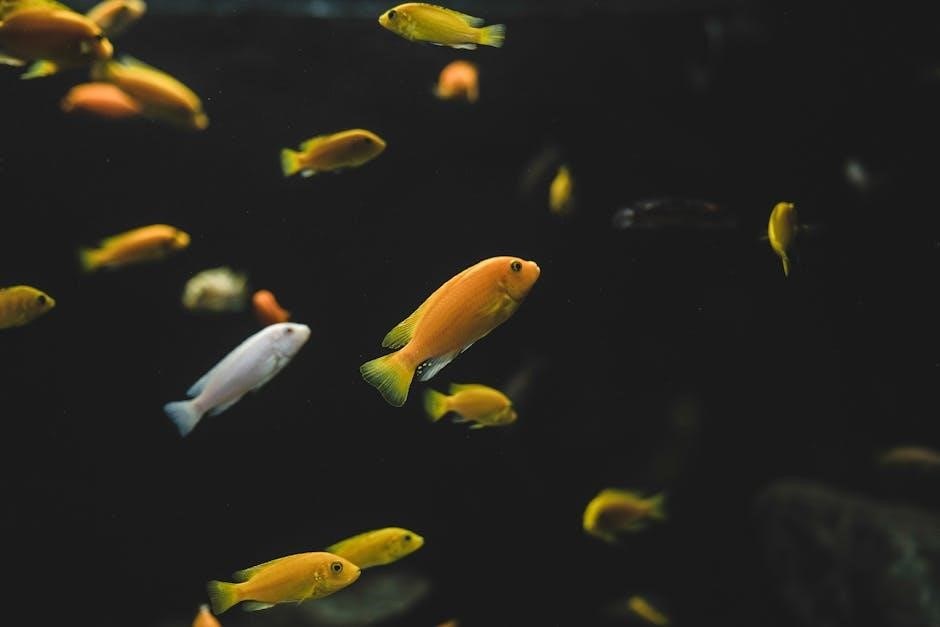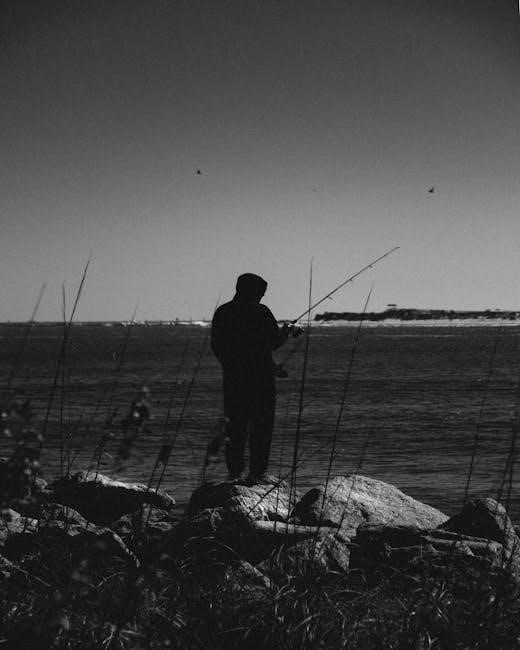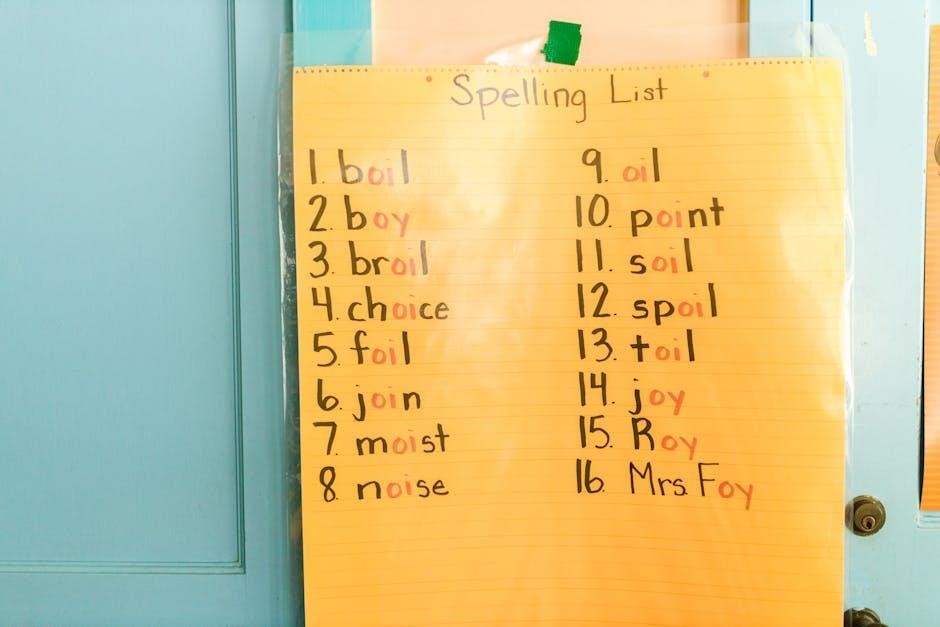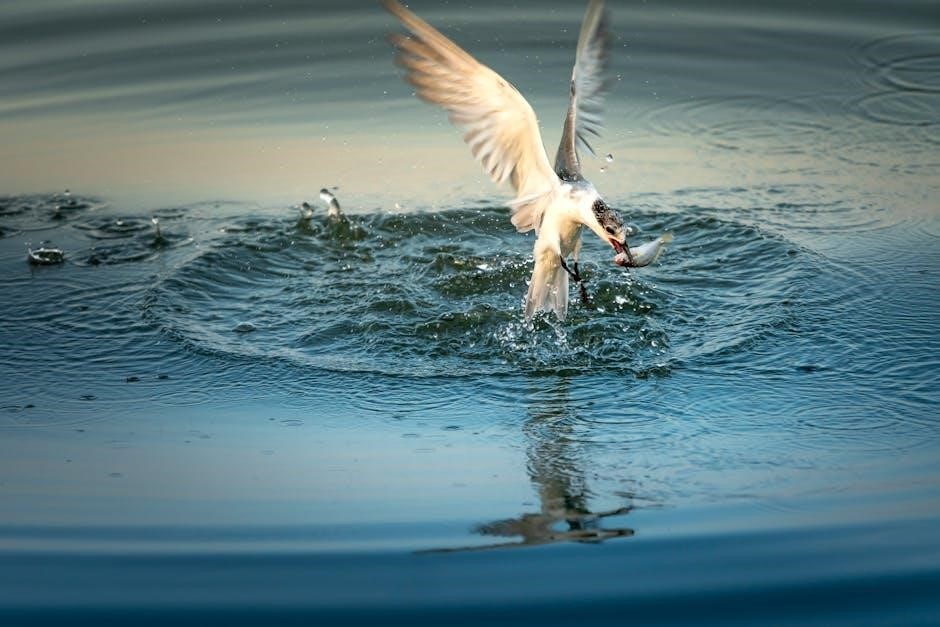Fly fishing guide schools offer hands-on training for aspiring guides‚ teaching essential techniques‚ on-water skills‚ and conservation practices to excel in the fly fishing industry.
What Are Fly Fishing Guide Schools?
Fly fishing guide schools are specialized training programs designed to equip individuals with the skills and knowledge needed to become professional fly fishing guides. These schools combine classroom instruction with hands-on experience‚ covering topics like advanced fishing techniques‚ knot-tying‚ casting‚ and understanding fish behavior. Students also learn about local ecosystems‚ wildlife conservation‚ and client communication. Many programs emphasize safety protocols‚ trip planning‚ and the business aspects of guiding. Graduates gain the expertise to lead successful and educational fly fishing trips‚ preparing them for careers in this rewarding outdoor industry.
Why Attend a Fly Fishing Guide School?
Attending a fly fishing guide school provides a comprehensive path to mastering the skills and knowledge needed to excel as a professional guide. These programs offer structured learning‚ hands-on practice‚ and expert mentorship‚ helping students refine their techniques and gain confidence. By learning from experienced instructors‚ participants can elevate their fishing prowess‚ understand local ecosystems‚ and develop essential client interaction skills. This training not only enhances personal fishing abilities but also equips individuals to turn their passion into a successful career‚ creating unforgettable experiences for clients on the water.

Curriculum and Training Programs
Fly fishing guide schools offer structured programs that combine classroom instruction with on-water practice‚ focusing on skills like casting‚ knot-tying‚ and environmental conservation‚ ensuring well-rounded expertise.
Core Courses and Skills Taught
Fly fishing guide schools emphasize comprehensive training‚ covering essential skills such as advanced casting techniques‚ knot-tying‚ fly tying‚ and water reading. Students learn about local fish behavior‚ eco-friendly practices‚ and safety protocols. Courses also focus on customer service‚ trip planning‚ and equipment maintenance. Hands-on instruction ensures graduates are proficient in guiding clients effectively and responsibly. These foundational skills prepare aspiring guides to excel in various fishing environments and conditions.
Practical Experience and On-the-Water Training
Fly fishing guide schools prioritize hands-on learning‚ offering extensive on-the-water training in real fishing environments. Students practice guiding techniques‚ client interaction‚ and safety protocols under expert supervision. They learn to navigate diverse water conditions‚ handle equipment‚ and manage emergencies. Practical sessions focus on applying classroom knowledge to real-world scenarios‚ ensuring graduates are confident and capable in the field. Mentorship from experienced instructors enhances the learning process‚ preparing students for the challenges of professional guiding.

Benefits of Attending a Fly Fishing Guide School
Attending a fly fishing guide school enhances career opportunities‚ develops advanced fishing skills‚ and provides networking chances‚ while offering hands-on experience in the fly fishing industry.
Improved Fishing Techniques and Knowledge
Fly fishing guide schools provide comprehensive training in advanced techniques‚ including casting‚ fly tying‚ and water reading. Students gain deep knowledge of fish behavior‚ habitat‚ and seasonal patterns. Practical instruction covers various fishing methods‚ such as nymphing and dry fly techniques‚ ensuring graduates are well-rounded anglers. The curriculum emphasizes adapting strategies to different environments‚ from rivers to lakes‚ preparing students to handle diverse fishing conditions effectively. This expertise is crucial for both personal growth and professional success in guiding.

Networking Opportunities in the Fly Fishing Industry
Attending a fly fishing guide school opens doors to valuable connections within the industry. Students interact with experienced instructors‚ professional guides‚ and like-minded peers‚ fostering lasting relationships. Many schools host guest speakers from reputable fly shops‚ lodges‚ and conservation organizations‚ offering insights and opportunities. Networking events and alumni groups further enhance these connections‚ providing a strong foundation for career growth. These relationships often lead to job opportunities‚ mentorship‚ and partnerships‚ making them a key benefit of enrolling in a guide school.

Required Skills and Qualifications
Success as a fly fishing guide demands patience‚ strong communication skills‚ problem-solving abilities‚ and basic first aid knowledge. A deep understanding of local ecosystems is essential.
Physical and Mental Demands of the Job
Fly fishing guides must possess physical stamina for long hours on the water‚ including wading and casting repeatedly. Mental focus is crucial for reading water conditions‚ adapting to weather changes‚ and solving unexpected challenges. Guides need excellent hand-eye coordination and patience to teach and guide clients effectively. The job also requires resilience to work in diverse outdoor conditions‚ from cold mornings to hot afternoons‚ while maintaining a positive and professional demeanor.
Certifications and Licenses Needed
To become a fly fishing guide‚ specific certifications and licenses are required. These include first aid and CPR certification‚ as well as a boating safety license if guiding from a boat. Additionally‚ many states require a commercial fishing guide license‚ which involves passing a background check and paying fees. Some schools may also offer specialized certifications‚ such as advanced fly fishing techniques or environmental stewardship. These credentials ensure guides are qualified‚ safe‚ and legally permitted to operate in their region.

Best Fly Fishing Guide Schools Globally
Renowned fly fishing guide schools worldwide offer expert instruction‚ hands-on experience‚ and access to pristine fishing locations‚ ensuring students gain comprehensive skills and industry connections.
Top-Rated Schools in the United States
The U.S. is home to several elite fly fishing guide schools‚ such as those in Montana‚ Colorado‚ and Alaska; These schools are renowned for their experienced instructors‚ offering comprehensive training in fly fishing techniques‚ gear maintenance‚ and client management. Many programs emphasize hands-on learning on iconic rivers‚ ensuring students gain real-world experience. Graduates often secure guiding positions with top outfitters‚ leveraging the schools’ strong industry connections. These institutions are pivotal for aspiring guides seeking to master both the craft and business of fly fishing.
International Schools and Their Unique Programs
International fly fishing guide schools offer diverse programs tailored to global fishing environments. Schools in countries like New Zealand and Chile focus on unique species and local ecosystems‚ providing specialized training. For instance‚ programs in Iceland emphasize cold-water fishing techniques‚ while those in the Caribbean may focus on saltwater fly fishing. These schools often combine cultural immersion with technical skills‚ offering students a well-rounded education. Their unique approaches prepare graduates for guiding opportunities worldwide‚ adapting to various fishing conditions and client needs.

Emerging Trends in Fly Fishing Guide Schools
Fly fishing guide schools are embracing modern techniques‚ integrating technology like casting apps and eco-friendly gear. Sustainability and conservation practices are also becoming central to curriculums.
Modern Techniques and Technologies
Fly fishing guide schools now incorporate advanced casting apps‚ GPS mapping tools‚ and eco-friendly gear. These technologies enhance learning‚ precision‚ and environmental sustainability‚ preparing guides for modern challenges. Students learn to use smartphone apps for tracking fish patterns and water conditions‚ while sustainable gear reduces ecological impact. Such innovations ensure guides are well-equipped to meet contemporary demands while maintaining the traditional essence of fly fishing. These advancements are reshaping the industry‚ making guide schools more effective and relevant.
Sustainability and Environmental Focus
Fly fishing guide schools emphasize sustainability and environmental stewardship‚ teaching students to minimize ecological impact. Courses cover conservation practices‚ habitat preservation‚ and ethical fishing methods. Many programs incorporate eco-friendly gear and promote catch-and-release techniques to protect fish populations. Guides are trained to educate clients on environmental responsibility‚ fostering a deeper appreciation for nature. This focus ensures that future generations can enjoy pristine fishing environments‚ aligning with global efforts to preserve aquatic ecosystems and biodiversity. Sustainability is a cornerstone of modern fly fishing education.

How to Choose the Right Fly Fishing Guide School

When selecting a fly fishing guide school‚ consider program reputation‚ experienced instructors‚ hands-on training opportunities‚ and support for future career development in the industry.
Factors to Consider When Selecting a School
When choosing a fly fishing guide school‚ evaluate the program’s reputation‚ instructor expertise‚ and hands-on training opportunities. Consider the curriculum’s depth‚ including both fishing techniques and business skills. Check the school’s location and access to diverse fishing environments. Class size and personalized attention are important for effective learning. Additionally‚ look for schools offering post-graduate support‚ such as job placement or networking opportunities. Finally‚ compare costs and ensure the program aligns with your career goals and personal interests in the fly fishing industry.
Success Stories from Graduates
Many graduates of fly fishing guide schools have successfully launched careers as professional guides or opened their own fly shops. These individuals often credit the schools for providing the skills and knowledge needed to excel in the industry. From mastering advanced fishing techniques to understanding client management‚ alumni highlight how the training prepared them for real-world challenges. Their success stories not only inspire prospective students but also underscore the value of formal education in achieving a fulfilling career in fly fishing.